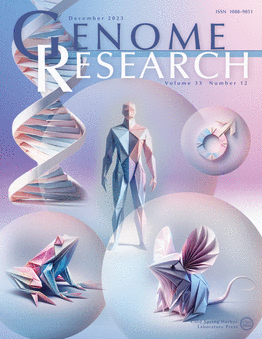APOBEC3A驱动人胃上皮脱氨酶突变
IF 5.5
2区 生物学
Q1 BIOCHEMISTRY & MOLECULAR BIOLOGY
引用次数: 0
摘要
癌症基因组经常携带APOBEC(载脂蛋白B mRNA编辑催化多肽样)相关DNA突变,表明APOBEC酶在癌症发生和进化过程中是先天诱变剂。然而,在人类正常细胞系中,该家族中特定酶的纯诱变作用尚不清楚。在这里,我们通过对携带强力霉素诱导的APOBEC表达盒的人类正常胃类器官系进行全基因组测序,研究了APOBEC3A和APOBEC3B的比较诱变活性。我们的研究结果表明,APOBEC3A的转录上调导致在几个细胞周期内获得大量基因组突变。相比之下,尽管有明显的脱氨酶活性和DNA损伤,APOBEC3B上调并未导致胃上皮细胞突变的显著增加。即使在TP53失活的情况下,apobec3b相关的突变仍然很小。对APOBEC3A上调后的突变景观的进一步分析揭示了APOBEC3A相关突变的详细谱,包括indel、主要是1bp缺失、聚集突变和选择性压力作用于携带突变的细胞的证据。我们的观察结果为理解APOBEC酶在人类细胞中的突变影响提供了明确的基础。本文章由计算机程序翻译,如有差异,请以英文原文为准。
APOBEC3A drives deaminase mutagenesis in human gastric epithelium
Cancer genomes frequently carry APOBEC (apolipoprotein B mRNA editing catalytic polypeptide-like)-associated DNA mutations, suggesting APOBEC enzymes as innate mutagens during cancer initiation and evolution. However, the pure mutagenic impacts of the specific enzymes among this family remain unclear in human normal cell lineages. Here, we investigated the comparative mutagenic activities of APOBEC3A and APOBEC3B, through whole-genome sequencing of human normal gastric organoid lines carrying doxycycline-inducible APOBEC expression cassettes. Our findings demonstrated that transcriptional upregulation of APOBEC3A led to the acquisition of a massive number of genomic mutations in just a few cell cycles. By contrast, despite clear deaminase activity and DNA damage, APOBEC3B upregulation did not generate a significant increase in mutations in the gastric epithelium. APOBEC3B-associated mutagenesis remained minimal even in the context of TP53 inactivation. Further analysis of the mutational landscape following APOBEC3A upregulation revealed a detailed spectrum of APOBEC3A-associated mutations, including indels, primarily 1 bp deletions, clustered mutations, and evidence of selective pressures acting on cells carrying the mutations. Our observations provide a clear foundation for understanding the mutational impact of APOBEC enzymes in human cells.
求助全文
通过发布文献求助,成功后即可免费获取论文全文。
去求助
来源期刊

Genome research
生物-生化与分子生物学
CiteScore
12.40
自引率
1.40%
发文量
140
审稿时长
6 months
期刊介绍:
Launched in 1995, Genome Research is an international, continuously published, peer-reviewed journal that focuses on research that provides novel insights into the genome biology of all organisms, including advances in genomic medicine.
Among the topics considered by the journal are genome structure and function, comparative genomics, molecular evolution, genome-scale quantitative and population genetics, proteomics, epigenomics, and systems biology. The journal also features exciting gene discoveries and reports of cutting-edge computational biology and high-throughput methodologies.
New data in these areas are published as research papers, or methods and resource reports that provide novel information on technologies or tools that will be of interest to a broad readership. Complete data sets are presented electronically on the journal''s web site where appropriate. The journal also provides Reviews, Perspectives, and Insight/Outlook articles, which present commentary on the latest advances published both here and elsewhere, placing such progress in its broader biological context.
 求助内容:
求助内容: 应助结果提醒方式:
应助结果提醒方式:


